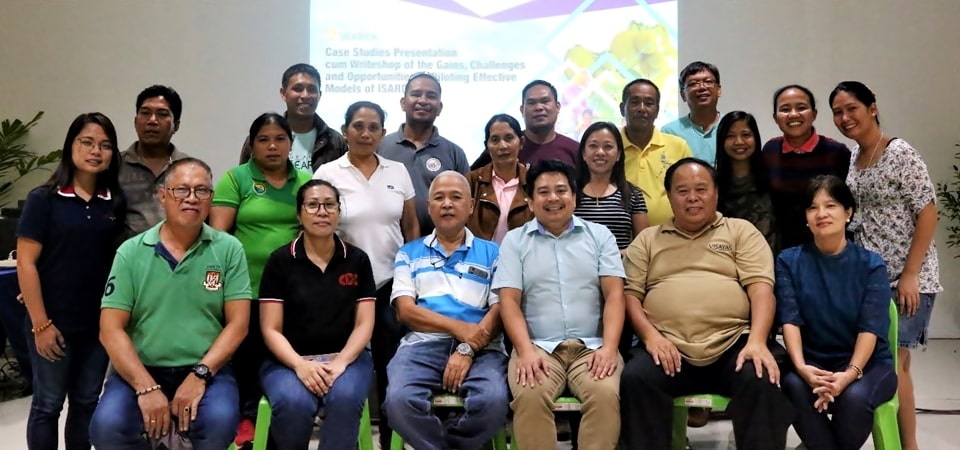 Workshop participants who attended the case studies presentation cum writeshop of the ISARD project.
Workshop participants who attended the case studies presentation cum writeshop of the ISARD project.
BAYBAY CITY, Leyte – Conveying together the partners who have successfully implemented the project Piloting and Up-scaling Effective Models of Inclusive and Sustainable Agriculture (ISARD), SEARCA spearheaded a three-day workshop titled, Case Studies Presentation cum Writeshop of the Gains, Challenges and Opportunities in Piloting Effective Models of ISARD on 16-18 July 2019 in Visayas State University, Baybay City, Leyte. The activity aimed at validating and finalizing the case studies and drafting the terminal report of the project. It was also a venue to discuss and document success stories of the two pilot sites in Victoria, Oriental Mindoro and Inopacan, Leyte, to realize the gains of the project and gather recommendations for the way forward, especially the project's scaling up to other sites locally and internationally.
The event was facilitated by the ISARD project management team from SEARCA composed of Dr. Pedcris M. Orencio, Program Head, Ms. Donna Bae N. Malayang, Program Associate, and Ms. Ruth Jazrel M. Bandong, Project Associate, all from the Research and Development Department (RDD), and Dr. Jose R. Medina, Overall Program Coordinator. Dr. Pamela A. Custodio, Assistant Professor V of the College of Development Communication in UPLB was invited as a Resource Person cum Facilitator of the workshop.
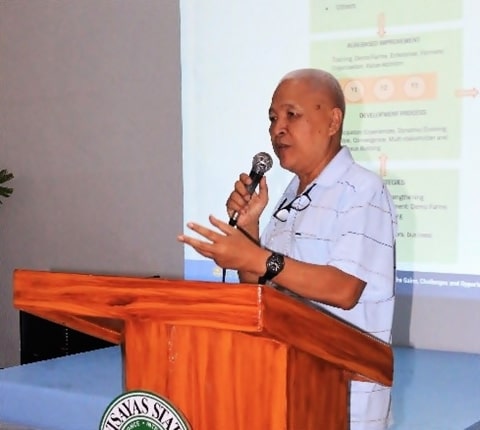 Dr. Jose R. Medina, ISARD Overall Program Coordinator, discussing the workshop overview.Partners of the ISARD project from Mindoro State College of Agriculture and Technology (MinSCAT) headed by Dr. Ma. Concepcion L. Mores and Visayas State University (VSU) headed by Dr. Jose L. Bacusmo participated in the event. Representatives from the LGU Victoria, Victoria Kalamansi Farmers Federation (VKFF), LGU Inopacan, Hinabay Women Workers Association (HIWWA), Hinabay Upland Farmers Association (HUFA) and Inopacan Jackfruit Farmers Association (IJFA) also joined the activity.
Dr. Jose R. Medina, ISARD Overall Program Coordinator, discussing the workshop overview.Partners of the ISARD project from Mindoro State College of Agriculture and Technology (MinSCAT) headed by Dr. Ma. Concepcion L. Mores and Visayas State University (VSU) headed by Dr. Jose L. Bacusmo participated in the event. Representatives from the LGU Victoria, Victoria Kalamansi Farmers Federation (VKFF), LGU Inopacan, Hinabay Women Workers Association (HIWWA), Hinabay Upland Farmers Association (HUFA) and Inopacan Jackfruit Farmers Association (IJFA) also joined the activity.
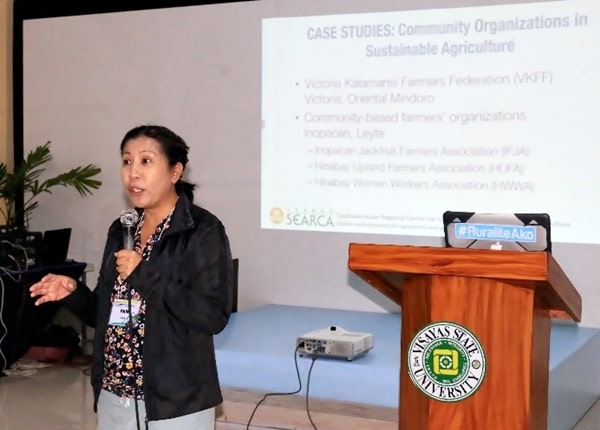 Dr. Pamela A. Custodio presenting the case studies of the ISARD two pilot sites.Dr. Jose R. Medina, the ISARD Overall Program Coordinator, started off the program with a workshop overview through a framework that shows the situation of the sites and the tripartite partnerships among farmer's organizations, academe and the LGU with key strategies to achieve the expected outputs and outcomes of the project. Dr. Pamela A. Custodio, on the other hand, presented the case studies of the two project sites and suggested some content addition to the case studies during the breakout sessions.
Dr. Pamela A. Custodio presenting the case studies of the ISARD two pilot sites.Dr. Jose R. Medina, the ISARD Overall Program Coordinator, started off the program with a workshop overview through a framework that shows the situation of the sites and the tripartite partnerships among farmer's organizations, academe and the LGU with key strategies to achieve the expected outputs and outcomes of the project. Dr. Pamela A. Custodio, on the other hand, presented the case studies of the two project sites and suggested some content addition to the case studies during the breakout sessions.
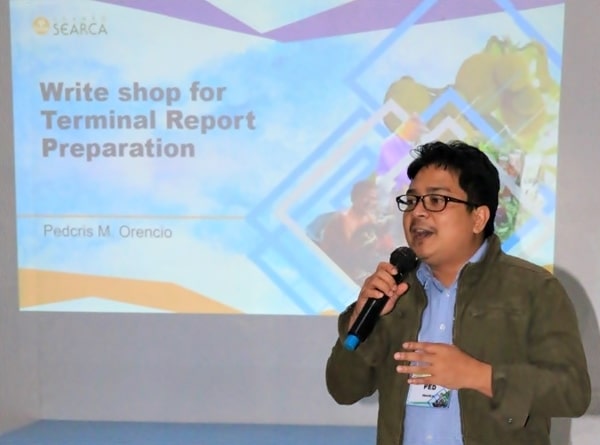 Dr. Pedcris M. Orencio discussing the mechanics of the writeshop.Dr. Pedcris M. Orencio discussed the mechanics and technical sessions of the write shop. He leveled off the expectations from the activity by reviewing what was done during the previous workshops of the ISARD project and the anticipated output of the current activity. He emphasized the action to impact principle of the project and underscored the importance of the implementation of interventions to make a meaningful difference and improvement in the lives of participating farmers and rural communities. The site-based objectives of the project were also presented.
Dr. Pedcris M. Orencio discussing the mechanics of the writeshop.Dr. Pedcris M. Orencio discussed the mechanics and technical sessions of the write shop. He leveled off the expectations from the activity by reviewing what was done during the previous workshops of the ISARD project and the anticipated output of the current activity. He emphasized the action to impact principle of the project and underscored the importance of the implementation of interventions to make a meaningful difference and improvement in the lives of participating farmers and rural communities. The site-based objectives of the project were also presented.
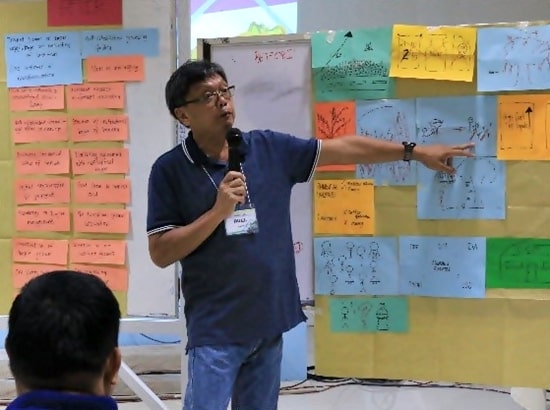 Mr. Ruel A. Sanchez, President of the Victoria Kalamansi Farmers Federation (VKFF) in Oriental Mindoro presenting their workshop output.The breakout sessions took off from identifying the list of situations of the sites prior to the ISARD project interventions. The technical sessions of the workshop include Framework Analysis, Overall Project Implementation Assessment, and Suggestions for Sustainable Implementation. The sites presented their respective outputs at the end of the program.
Mr. Ruel A. Sanchez, President of the Victoria Kalamansi Farmers Federation (VKFF) in Oriental Mindoro presenting their workshop output.The breakout sessions took off from identifying the list of situations of the sites prior to the ISARD project interventions. The technical sessions of the workshop include Framework Analysis, Overall Project Implementation Assessment, and Suggestions for Sustainable Implementation. The sites presented their respective outputs at the end of the program.
The workshop summed up the three-year significant accomplishments of the project. It served as a "look back" to the lessons learned during the project implementation by identifying the facilitating and hindering factors experienced by SEARCA and the partners. The ISARD implementation model was also analyzed during the workshop to assess how it was translated into development strategies employed by the project anchored to its four project components namely (1) technical assistance; (2) capacity building; (3) knowledge management; and (4) linkaging and networking.